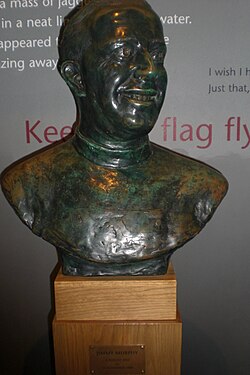This article needs additional citations for verification. (April 2014) |
 | |||
| Personal information | |||
|---|---|---|---|
| Full name | James Patrick Murphy | ||
| Date of birth | 8 August 1910 | ||
| Place of birth | Pentre, Rhondda, Wales | ||
| Date of death | 14 November 1989 (aged 79) | ||
| Place of death | Manchester, England | ||
| Height | 5 ft 8 in (1.73 m)[1] | ||
| Position(s) | Wing half | ||
| Senior career* | |||
| Years | Team | Apps | (Gls) |
| 1928–1939 | West Bromwich Albion | 204 | (0) |
| 1939 | Swindon Town | 4 | (0) |
| Total | 208 | (0) | |
| International career | |||
| 1933–1938 | Wales | 15 | (0) |
| Managerial career | |||
| 1956–1964 | Wales | ||
| 1958 | Manchester United (caretaker) | ||
| *Club domestic league appearances and goals | |||
James Patrick Murphy (8 August 1910 – 14 November 1989) was a Welsh footballer who made over 200 appearances for West Bromwich Albion and won 15 caps for the Wales national team, which he later managed. Murphy is most famous for being an influential figure at Manchester United from 1946 until the 1970s, as assistant manager, first-team coach, reserve team manager and a full-time scout, although he disliked the limelight and preferred to work quietly behind the scenes.
Following the Munich air disaster on 6 February 1958, Murphy temporarily took over as Manchester United manager until the end of the 1957–58 season, steering the club through its greatest crisis while Matt Busby recovered from his injuries, and put together a makeshift team in place of the players who had died or were recovering from their injuries. Murphy had not been on the Munich aeroplane, as he had missed the trip in order to take charge of Wales in a 1958 FIFA World Cup qualifying match against Israel in Cardiff on the same night as Manchester United's match against Red Star Belgrade in Yugoslavia. Wales won the match and qualified for the FIFA World Cup for the first time.
- ^ "West Bromwich Albion. Directors rely on reserves". Sunday Dispatch Football Guide. London. 23 August 1936. p. iv – via Newspapers.com.